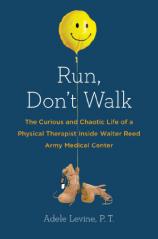Author Talk: March 2014
Adele Levine’s memoir, RUN, DON’T WALK, is about her experience working as a physical therapist at the Walter Reed Army Medical Center in Washington, D.C. Here, she talks about the impact working in the hospital’s amputee rehabilitation clinic had on her life, why she felt compelled to write about it and what she hopes readers will take away from her book.
Question: What made you want to write this book?
Adele Levine: The congressional closure of Walter Reed Army Medical Center and our subsequent transfer to Bethesda Naval Hospital (later renamed Walter Reed National Military Medical Center) made me want to write this book. I thought that a book about the amputee center at the original Walter Reed, could, in a way, stop time and preserve the historic hospital at its finest hour. While I was far from the best physical therapist there, I knew the one thing that I could do was write. And that as an insider I would be able to write about Walter Reed in a realistic manner that wouldn’t be corny or cheesy, something that an outside journalist would not be able to accomplish. After Walter Reed Army Medical Center closed and I was working at the new hospital, with the gift of time and distance, I was able to devote myself to writing a humane and humorous book.
Q: Have any of your coworkers or former patients read the book? What have their reactions been, or what do you expect them to be?
AL: I had my immediate coworkers, my supervisors and my boss read the manuscript before I submitted it for publication. It is as much their story as mine and I wanted their blessing. They were supportive and all, surprisingly, sentimental. One of my former coworkers told me that working at Walter Reed was the best job she ever had, and she was so happy to have a book that described our experiences. She said she would read RUN, DON’T WALK over and over and over to never forget what happened at Walter Reed Army Medical Center.
The patients were also very supportive of the idea of this book. That surprised me. I didn’t think any of them would really be interested in a book about a Walter Reed physical therapist, but many of them told their families about it and bought early copies. Two former Walter Reed Army Medical Center patients wrote blurbs for the back cover.
Q: One scene in the book details how you stole a rug from Home Depot (107). Why did you include that scene in the book? Tell us --- did you ever return the rug?
AL: I included it because it was an example of how Walter Reed bled over into my personal life. Even off work, I was still at work…Being a physical therapist at Walter Reed was a stressful job --- the early hours and the workload. I didn’t always handle the pressure well. Later, I thought the Home Depot story was funny --- but in an uncomfortable way. I never returned the rug. But I felt really guilty about it and didn’t unroll it for several months.
Q: Why do you think Cosmo (or the patients who comprised his composite character) struck such a chord with you?
AL: All of my patients struck a chord with me. My coworkers used to make fun of me for being a “mother hen.” But I especially struggled with the patients that made up the character of Cosmo --- all that they went through, and are probably still going through. One in particular had so much potential and when he wasn’t doing well, I blamed myself. I had many, many sleepless nights. The turning point for me was that random conversation I had with the visiting anthropologist --- that I was forcing my goals on my patients. It made me rethink how I defined success. That’s when I realized that Cosmo was going to do okay. And as a physical therapist, it made me take a step back and let my patients dictate the pace of their rehab.
Q: Apart from a few scenes, such as the D.C. party you went to with a friend (176), politics were mostly absent from this book. Was that a conscious choice? Within the amputee clinic, did personal politics ever become an issue among staff members or when politicians visited?
AL: I deliberately kept politics out of my book.
My job at Walter Reed was to be there for the patients. A lot of people visited Walter Reed for political reasons and personal gain, but in our clinic, (as our patients liked to joke,) it was “just another day in paradise.” The only day that was difficult was when Hamid Karsi (the President of Afghanistan) visited --- I think a lot of the patients were troubled by his visit. But they still pulled it together and everyone was cordial.
Politics would come up from time to time in our clinic --- especially during election years, but mostly in the form of good-natured teasing. I believe there was a joke donation made in Jim’s name to a candidate he despised by one of the patients.
Before I worked at Walter Reed I was very caught up in politics --- it is practically a professional sport down here in Washington, D.C. I once got so worked up watching “Meet the Press” on TV while biking on my bike trainer at home, that I fell off my bike and crashed through the coffee table. But now, after almost nine years of sweeping up after the war machine, I have become very cynical. I don’t keep up with politics. I noticed that, in spite of new presidents and different congressional representatives, nothing seemed to change on our end. Patients continue to flood in. And in the middle of everything, our hospital got shut down. I sure don’t watch Meet the Press” anymore…
Q: What do you hope readers take away from this book?
AL: I hope my book helps people recognize the sacrifices of war, and how many people are involved in helping our young military veterans recover. This is our country’s longest war and no one even seems to realize it’s going on.
I hope it highlights the importance of adequate rehabilitation and access to good prosthetics. Civilian amputees may wait over a year for a primitive prosthetic. They only get a few weeks of rehab --- just barely enough to send them home from the hospital. Even if they privately raise the money to buy top of the line prosthetics, because of limited physical therapy they walk terribly, they have falls, they rely on crutches and walkers, and this contributes to their continued physical decline and loss of independence. We need to do better than that.
I hope that people who read my book see it as a metaphor for our country as a whole, because as a nation we are going through a difficult time. Congress --- take a page out of our book! Our hospital was a microcosm of people of many different backgrounds from all over America. We came together for a common goal. We could have let the pressure and our differences get to us, but instead we all rolled up our sleeves and got to work. And I’m not talking about just the staff --- but the patients and their families, too.
Lastly, I hope people in D.C. who drive past the old 100-year-old buildings of the former Walter Reed Army Medical Center see it as a spiritual place. I know I do. Over 150,000 patients passed through those gates. There is a feeling there --- a spirit. With that many people over that many years, I am sure the air and ground is saturated with lingering hopes and dreams.



